The past couple of decades have seen a dramatic upsurge in popularity of 6.5mm cartridges in the United States. Here’s what you need to know about two of the most popular: the 6.5 Grendel and the 6.5 Creedmoor.
While hunters and shooters in Europe first embraced the 6.5 caliber well over a century ago, it has taken much longer for that caliber to really catch on in North America. However, that’s changing fast as more and more Americans discover the advantages of the 6.5mm bore.
At this point, the 6.5 Grendel and the 6.5 Creedmoor are by far the most widely adopted 6.5mm cartridges in the United States. Though they have similar names and utilize bullets of the same diameter, that’s basically where their resemblance ends. Indeed, the designers of each cartridge had very distinct priorities in mind and built the 6.5 Creedmoor and 6.5 Grendel to accomplish very different tasks.
Today, I’m going to discuss the strengths and weaknesses of the 6.5 Grendel vs 6.5 Creedmoor to help provide some insight into which cartridge will work best for you.
Before we get started, I have an administrative note:
Some of the links below are affiliate links. This means I will earn a small commission (at no extra cost to you) if you make a purchase. This helps support the blog and allows me to continue to create free content that’s useful to hunters like yourself. Thanks for your support.
Additionally, I recorded an entire podcast episode on this exact subject. If you’d rather listen than read, click the appropriate link below to listen to this episode on your preferred podcasting service.
6.5 Creedmoor vs 6.5 Grendel Podcast
Apple | Google | iHeart | Pandora | Spotify
6.5 Grendel vs 6.5 Creedmoor: History
As stated previously, the 6.5 Grendel and the 6.5 Creedmoor were each designed to accomplish different goals. For this reason, the story of each cartridge begins in a different place as well: with the .223 Remington and the AR-15 for the 6.5 Grendel and with the .308 Winchester for the 6.5 Creedmoor.
We’ll start with the 6.5 Grendel since it came along first.
The M-16 rifle and 5.56x45mm NATO cartridge got off to a rough start in Vietnam, but modifications to the rifle and ammunition solved most of the problems that plagued the system during the war. However, many still had doubts regarding the stopping power of the diminutive cartridge.
These concerns were shared by civilian hunters who adopted the AR-15 and .223 Remington cartridge during the last couple decades of the 20th Century. While the rifle and cartridge worked extremely well for target shooting and predator/varmint hunting, the .223 Remington developed a reputation for poor performance on deer sized game.
However, the AR-15 platform offered a number of advantages to shooters and, not surprisingly, was also very popular in the United States. For this reason, designers set about developing a number of larger bore cartridges that were more powerful than the .223 Remington, but would still function in AR-15 rifles. Among others, this list includes cartridges like the .300 Blackout, the 6.8 Remington SPC (also known as the 6.8 SPC), the .450 Bushmaster, the .458 SOCOM and the .50 Beowulf.
Bill Alexander (the same guy who developed the .50 Beowulf) also designed the 6.5 Grendel to fit this same need in 2002. By modifying a 6.5mm PPC case (itself descended from the .220 Russian and the 7.62x39mm cartridges), Alexander was very successful in building an efficient and sweet shooting cartridge that functioned very well in the AR platform.
The 6.5 Grendel cartridge is also significantly more powerful than the .223 Remington. So, while the cartridge did struggle to gain widespread acceptance in the shooting and hunting communities for a variety of reasons, the 6.5 Grendel was very successful in accomplishing its original goal of improving upon the .223 Remington while still performing well in an AR-15.
To learn more about how the 6.5 Grendel compares to the .223 Remington and 5.56x45mm NATO, read the article below:
6.5 Grendel vs 5.56/223 Review & Comparison
On the other hand, the 6.5 Creedmoor got its start in the competition shooting realm.
Dave Emary and Dennis DeMille of Hornady Manufacturing began work developing a new cartridge in the early 2000s they hoped would provide an edge in high power rifle competition shooting, which had been long dominated by the .308 Winchester. In short, they wanted a new cartridge that was just as accurate as the .308, but with less recoil, less wind drift, and a flatter trajectory.
With these goals in mind, they modified a .30 Thompson Center (.30 TC) case to shoot .264″ bullets. When all was said and done, the cartridge had a relatively large case capacity optimized for use with 4350 class propellants. It could also accommodate long, heavy, high ballistic coefficient (BC) bullets without intruding into the powder column, and to top it all off, the cartridge still fit in a short action magazine.
Just like Emary and DeMille hoped, the new cartridge had less recoil, a flatter trajectory, and more resistance to wind drift than the .308 Winchester. Unveiled in 2008, the new 6.5 Creedmoor (named in honor of the Creedmoor Matches) was a big hit among competition shooters from the start.
As more and more people have started to appreciate the advantages of the cartridge, the 6.5 Creedmoor has also started to gain widespread acceptance for big game hunting.
If you’d like to learn more about the 6.5 Creedmoor and how it compares to the .308 Win, read this article:
6.5 Creedmoor vs 308 Winchester Debate Settled
6.5 Grendel vs 6.5 Creedmoor: Cartridge Sizes
As you can see in the photo below, aside from the fact that they both use .264″ bullets, there are some big differences between the 6.5 Grendel and the 6.5 Creedmoor cartridges.
First, the 6.5 Grendel is considerably shorter than the 6.5 Creedmoor.
This is because the Grendel was originally designed for use in an AR-15, which can only accommodate cartridges up to 2.26″ long. With an overall length of 2.26″, the 6.5 Grendel is the maximum size cartridge that will fit in an AR-15. At 2.825″ long, the 6.5 Creedmoor is much longer and requires a larger rifle that can accommodate a .308 Winchester sized cartridge (like the AR-10).
Second, the 6.5 Grendel has a rim diameter of . 441″ while the 6.5 Creedmoor has a larger .473″ rim diameter.
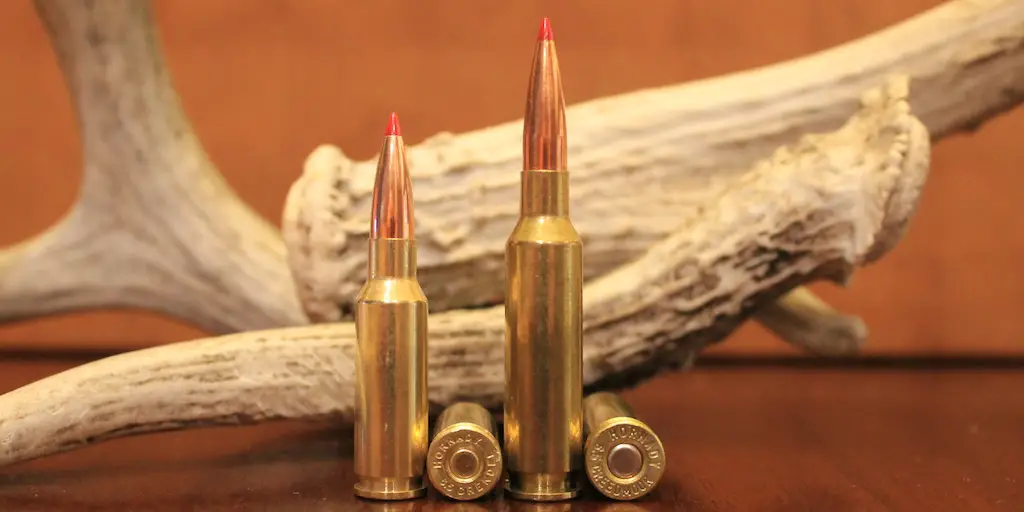
For these reasons, the 6.5 Creedmoor has a much larger case capacity than the 6.5 Grendel. It’s also loaded to a higher maximum average pressure than the 6.5 Grendel (62,000psi vs 52,000psi).
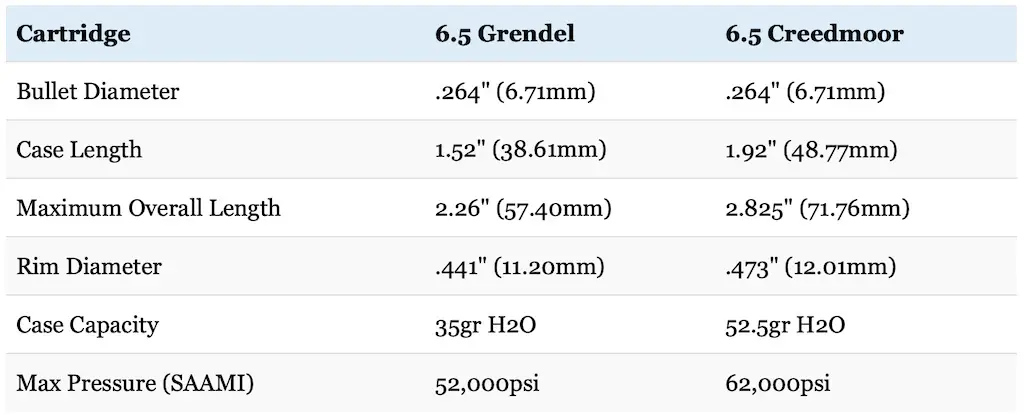
6.5 Creedmoor vs 6.5 Grendel Ballistics
As you might guess by looking the cartridges themselves, there is a pretty big difference in their ballistics.
When comparing the two cartridges, it’s important to remember that the 6.5 Grendel was designed to offer better performance out of an AR-15 than the .223 Remington while the 6.5 Creedmoor was developed to improve upon the .308 Winchester in certain aspects. The designers of both cartridges successfully accomplished those goals, but that also means there’s a big gap in performance between the 6.5 Grendel and 6.5 Creedmoor, just like there is with the .223 Remington and the .308 Winchester.
The table below compares a 123gr Hornady ELD Match load (.506 BC) in 6.5 Grendel to 120gr GMX (.450 BC) and 143gr ELD-X (.625 BC) loads in 6.5 Creedmoor. This data is for Hornady factory loads fired from a 24 inch barrel and using a 200 yard zero.
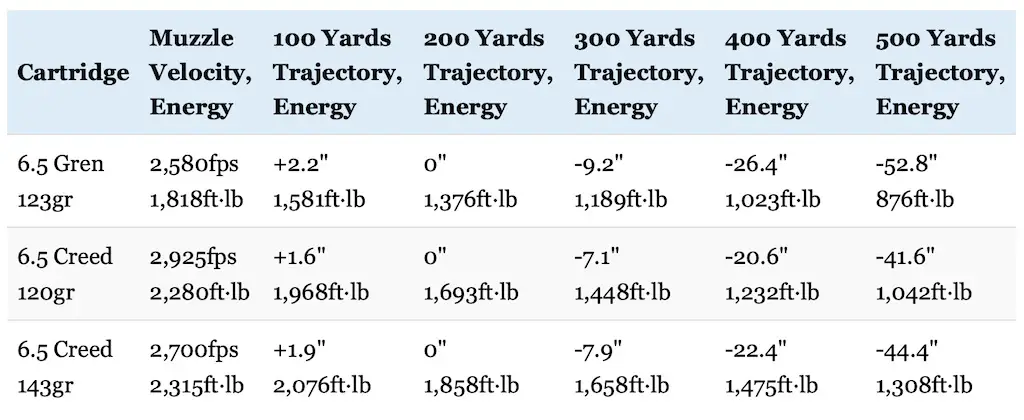
As you can see, due to the significantly larger case capacity of the 6.5 Creedmoor, it can push a heavier bullet at a faster muzzle velocity than the 6.5 Grendel. This obviously gives the cartridge a definite edge in terms of kinetic energy and trajectory.
The 6.5 Creedmoor loads have 8-11″ less bullet drop at 500 yards and retain approximately 20-50% more energy down range than the 6.5 Grendel load. Indeed, the 143gr 6.5 Creedmoor load has more energy at 200 yards than the 6.5 Grendel has at the muzzle. That being said, while the Creedmoor has a definite advantage in performance at all practical ranges, the gap in performance between the cartridges is not nearly as large at ranges inside 300 yards.
The chart below compares how much a 10 mile per hour crosswind impacts those same 6.5 Grendel and 6.5 Creedmoor loads out to 500 yards.
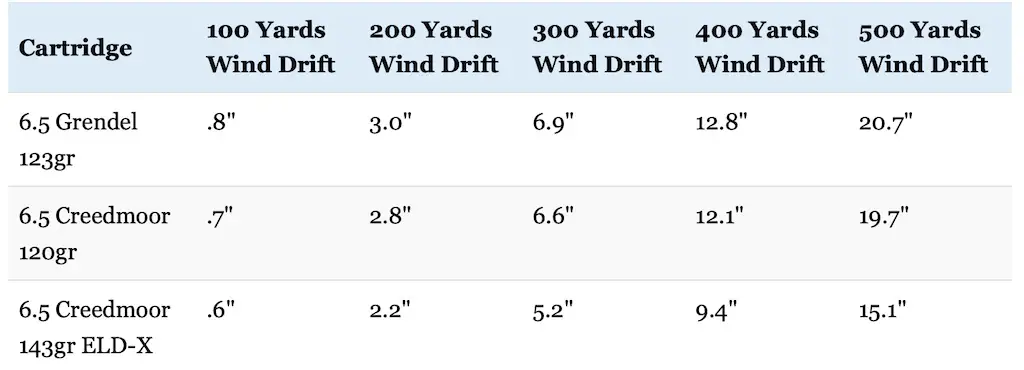
Once again we see that the 6.5 Creedmoor, particularly with the 143gr ELD-X load, outperforms the 6.5 Grendel in terms of wind drift. However, again, the difference between them narrows considerably inside 300 yards.
The table below compares the recoil produced by those same loads when fired from identical rifles (a Ruger American Predator in this case).
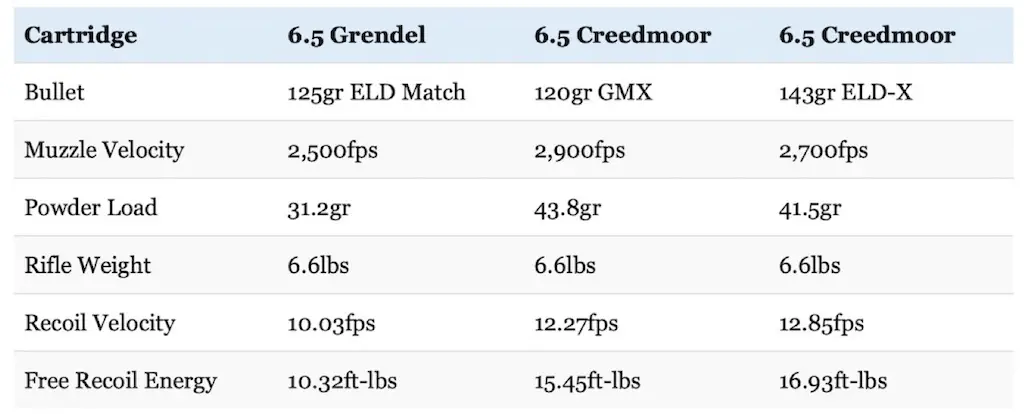
Felt recoil will vary from shooter to shooter and rifle to rifle, but free recoil energy is still a useful way to compare cartridges.
As you can see, the 6.5 Grendel has about 30-40% less free recoil energy than the two 6.5 Creedmoor loads. That’s really saying something because the 6.5 Creedmoor is also known for having a very mild recoil!
So where do we stand with each cartridge?
6.5 Grendel vs 6.5 Creedmoor
They use the same diameter bullets, but the 6.5 Creedmoor shoots the same weight bullet 300-400fps faster than the 6.5 Grendel because it’s loaded to a higher pressure and uses a longer case. For this reason, the 6.5 Creedmoor recoils more, but has a flatter trajectory, less wind drift, and carries more energy downrange.
The 6.5 Creedmoor is a moderately powerful, relatively flat shooting cartridge that’s also pretty resistant to wind drift. Though it does have more recoil than the 6.5 Grendel, the 6.5 Creedmoor recoil is still noticeably lighter than the .308 Winchester and most shooters and hunters can handle it without much trouble at all.
Additionally, the 6.5 Creedmoor also has an advantage when it comes to bullet selection. While both cartridges utilize .264″ bullets, the 6.5 Creedmoor was specifically designed to utilize the longest and heaviest bullets available. The cartridge typically uses bullet weights in the 95-160 grain range, with 120, 129, 140, and 143gr bullets being the most common. On the other hand, the 6.5 Grendel uses lighter bullets and tops out around 130 grains. 120 and 123 grain bullets are most popular.
While the 6.5 Grendel gives up a lot to the 6.5 Creedmoor in terms of ballistics, this is especially pronounced at longer distances. The 6.5 Creedmoor still has better ballistics inside of 300 yards, but the difference between them is much smaller at closer range. When all is said and done, the 6.5 Grendel is still powerful enough for hunting medium sized game at short to moderate range and, if we’re being honest with ourselves, the 6.5 Creedmoor is far from a heavy hitting cartridge in the same league as the 7mm Rem Mag or 300 Win Mag.
It’s really difficult to pick an accuracy winner between the 6.5 Grendel vs 6.5 Creedmoor. On one hand, the 6.5 Creedmoor was designed for competition shooting and can shoot really long and aerodynamic bullets. On the other hand, the 6.5 Grendel has also seen extensive use in the hands of competition shooters and also has an advantage in the recoil department.
Don’t underestimate the impact that recoil has on the ability of a person to shoot accurately either. Regardless of how well a given person handles recoil, all other things being equal, they will absolutely shoot better with a milder recoil.
Inside of 300 yards, I’d give the edge to the 6.5 Grendel. At longer range, I’d lean more towards the 6.5 Creedmoor where using high BC bullets becomes more important.
In any case, both cartridges are absolutely capable of tack driving accuracy in the right hands.
6.5 Grendel vs 6.5 Creedmoor: Ammunition Selection
Though it might not be among the Top 10 best selling rifle cartridges in the United States quite yet, the 6.5 Creedmoor is rapidly growing in popularity and it seems like more and more ammo choices are available for it each year.
Not surprisingly, most ammunition manufacturers, like Barnes, Berger, Browning, Federal, Hornady, HSM, Norma, Nosler, Remington, Sellier & Bellot, Sierra, Sig Sauer, Swift, and Winchester (just to name a few) produce a variety of ammo for the 6.5 Creedmoor.
On the other hand, the 6.5 Grendel is nowhere near as popular as the Creedmoor. Like the .50 Beowulf, the 6.5 Grendel was a proprietary cartridge for a number of years and none of the big ammo companies produced 6.5 Grendel ammo. Though it’s now SAAMI certified, it’s taking a while for the cartridge to make up for lost time.
Fortunately, Federal, Hornady, Nosler, and Wolf all manufacture 6.5 Grendel factory ammo in addition to Alexander Arms, the original producer.
Virtually every major style of bullet is available in .264 caliber as well like the Barnes LRX, TSX, TTSX, and TAC-X, the Hornady ELD-X, GMX, InterBond, InterLock, SST, and V-Max, the Nosler AccuBond, AccuBond Long Range, Ballistic Tip, E-Tip, and Partition, the Remington Core Lokt, and the Swift Scirocco and A-Frame (just to name a few).
Correspondingly, while prices and availability vary from region to region, the 6.5 Creedmoor is by far the most common and least expensive of the two.
BUY SOME GREAT 6.5 GRENDEL AMMO HERE
BUY SOME MORE GREAT 6.5 GRENDEL AMMO HERE
BUY SOME EXCELLENT 6.5 CREEDMOOR AMMO HERE
If you’d like to learn more about some of the various hunting ammunition choices for the 6.5 Grendel and 6.5 Creedmoor, read these articles:
Best 6.5 Grendel Ammo For Hunting Deer And Other Big Game
Best 6.5 Creedmoor Ammo For Hunting Elk, Deer, & Other Big Game
Handloading is relatively popular for both cartridges and reloading components are widely available. Since the two cartridges both utilize the same .264″ bullets that are also shared by cartridges like the 6.5x55mm Swedish Mauser, 6.5 Lapua, the .260 Remington, the 6.5 PRC, and the .264 Winchester Magnum, there’s an excellent selection of good quality bullets available to choose from.
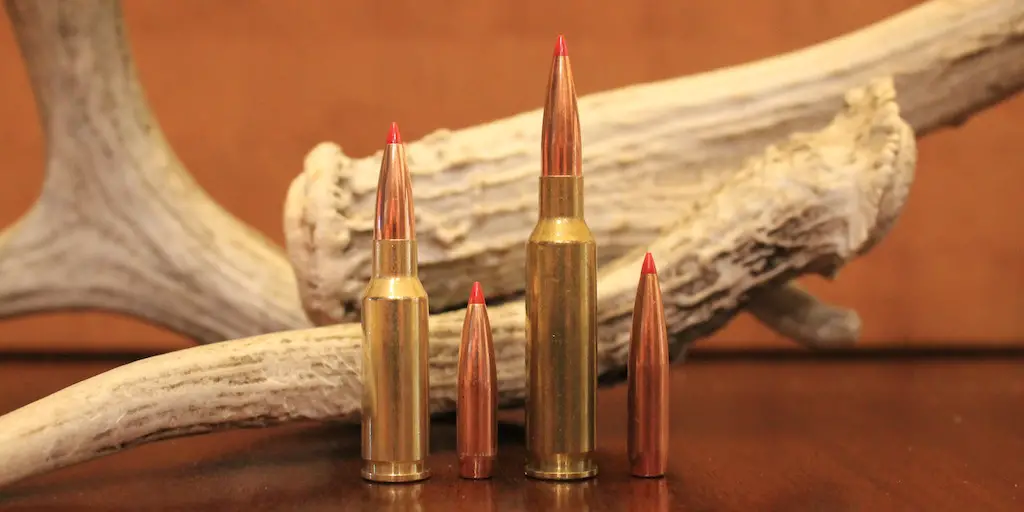
6.5 Grendel vs 6.5 Creedmoor: Rifle Selection
Once again, the 6.5 Creedmoor is the most widely available and multiple companies produce good semi-automatic as well as bolt-action rifles chambered in that cartridge. On the other hand, only a few companies make firearms chambered in 6.5 Grendel, though the selection is slowly improving.
The proprietary nature of the 6.5 Grendel also really hurt rifle development for a long time, as did the fact that the unique rim diameter of cartridge required shooters to get a new bolt face and magazine in addition to a new barrel. On the other hand, converting a rifle from .308 Winchester to 6.5 Creedmoor is a much simpler process and many companies have rapidly introduced new lines of 6.5 Creedmoor rifles by simply modifying existing .308 Winchester models.
Alexander Arms developed the first rifles in 6.5 Grendel and continues to do so. Since then, Wilson Combat and a couple of other companies have started producing modern sporting rifles chambered in the cartridge. It’s also possible to purchase a 6.5 Grendel upper receiver and convert an existing AR-15 to shoot the Grendel.
While there are several semi-auto rifles chambered in 6.5 Creedmoor like the Savage MSR 10, and the Seekins Precision SP10, there are even more bolt guns available in the cartridge like the Ruger American, FTW Hunter, Hawkeye Long Range Target, Ruger Precision Rifle, and Number 1 Rifles, the Remington Model 700, the Browning X-Bolt, the Nosler M48, the Weatherby Vanguard, and the Winchester Model 70.
The Ruger American Predator bolt action rifle is currently manufactured in both 6.5 Grendel and 6.5 Creedmoor.
BUY A DEPENDABLE 6.5 GRENDEL RIFLE HERE
BUY AN OUTSTANDING 6.5 CREEDMOOR RIFLE HERE
Read the article below if you’d like to learn more details about some of the various hunting rifle choices for the 6.5 Creedmoor.
Best 6.5 Creedmoor Rifles For Hunting – Ultimate Guide
6.5 Creedmoor vs 6.5 Grendel Magazines
We can’t have a 6.5 Grendel vs 6.5 Creedmoor comparison without discussing the magazine situation for each cartridge. In particular, this section is focused on magazines for use in AR-15 and AR-10 rifles.
First, things are pretty straightforward with the 6.5 Creedmoor.
Magpul has a reputation for being the gold standard in AR magazines. Their 223/5.56 magazines are excellent and so are their 308 magazines. Fortunately, their 308 magazines work great with the dimensionally similar 6.5 Creedmoor as well.
No need to overthink things here, so just go with the Magpul Gen M3 magazine (available with 20 and 25 round capacities) if you’re using an AR-10 in 6.5 Creedmoor. They also make 5 and 10 round AICS magazines for the 6.5 Creedmoor for use in the many other rifles using that style magazine.
You can get some of each type below.
BUY SOME GREAT 6.5 CREEDMOOR MAGAZINES HERE
Things are a little different for the 6.5 Grendel.
That cartridge can use regular M16 rifle/M4 carbine magazines with a slight decrease in magazine capacity (and sometimes in reliability). A typical 30 round 223/5.56 magazine will hold up to 26 6.5 Grendel rounds.
However, the cartridge has a larger rim diameter and significantly different shape compared to the 223/5.56 cartridges. For this reason, purpose built 6.5 Grendel magazines with a modified follower and feed lips provide optimal reliability.
Duramag and ASC produce quality 6.5 Grendel magazines with excellent reputations though (both are available below).
BUY SOME GREAT 6.5 GRENDEL MAGAZINES HERE
6.5 Grendel vs 6.5 Creedmoor: Which Is Right For You?
The 6.5 Grendel and 6.5 Creedmoor are both well suited for hunting thin skinned, small to medium game animals like pronghorn, feral hogs, mule deer, whitetail deer, and fallow deer at short to moderate range. Though it’s certainly capable of getting the job done under ideal conditions, I wouldn’t advise using the 6.5 Grendel for hunting anything bigger than deer though.
If you want to use a 6.5mm cartridge for hunting bigger game then go with the 6.5 Creedmoor. With ballistics very similar to the 6.5 Swede, which Scandinavian hunters have used to take untold numbers of moose with over the years, the 6.5 Creedmoor is much better suited for game like elk and moose. This is primarily because it can use heavier bullets with a higher sectional density than the 6.5 Grendel.
Even so, I’d still consider it to be a little on the light side for really big game. If you decide to go that route, it’s extremely important to use well constructed bullets, be very careful with shot placement, and only take shots at short range.
Do you primarily hunt medium sized game like deer, feral hogs, or black bear at ranges within 200 yards? Both cartridges will absolutely get the job done if you do your part and there isn’t much of a difference between them ballistically inside of 300 yards. Go with the 6.5 Creedmoor if you want the cheapest or easiest to find ammo and go with the 6.5 Grendel if you want to hunt with an AR-15.
Are you looking for a the better cartridge for long range hunting for game like mule deer or pronghorn in open country where you might need to take a shot at several hundred yards? Both will also work in this role, but the 6.5 Creedmoor has a flatter trajectory, will drift less in the wind, and carries significantly more energy out to 400-500 yards.
Do you prefer to use a semi-automatic rifle for hunting or for personal defense? Go with the 6.5 Grendel as there are many more semi-automatic rifles available in this cartridge than the 6.5 Creedmoor.
Are you sensitive to recoil and in need of a serious low recoil cartridge? Go with the 6.5 Grendel.
Do you want the round that is best suited for target shooting out to 1,200 yards or so in a precision rifle? Again, go with the 6.5 Creedmoor, which has a longer practical effective range and really stands head and shoulders above the 6.5 Grendel for precision long range shooting.
Do you want a hunting cartridge that’s well suited for caribou, moose, elk, eland, kudu, or red stag hunting? I consider both to be on the light side, but the 6.5 Creedmoor is clearly the better choice because it has much more kinetic energy at all ranges and can use heavier bullets.
Yes, you can hunt elk with the 6.5 Creedmoor, but you need to be aware of a couple of things before you go down that road.
To that end, I recorded an entire podcast episode on elk hunting with the 6.5 Creedmoor with someone who has cleanly taken elk with the cartridge. Our discussion does a great job of covering the pros and cons of the 6.5 Creedmoor for elk hunting and anyone planning on going elk hunting in the future should definitely listen to this interview.
Just click the appropriate link below to listen to this episode on your preferred podcasting service. Be sure to hit that “subscribe” or “follow” button if you like the show!
6.5 Creedmoor For Elk Hunting Podcast
Apple | Google | iHeart | Spotify
As I’ve stated several times in this article, the 6.5 Grendel and the 6.5 Creedmoor are both solid rifle cartridges. However, since they were designed with very different goals in mind, the differences between them (6.5 Grendel vs 6.5 Creedmoor) is pretty big in many respects. Carefully evaluate your needs as a hunter based upon the circumstances you foresee using the cartridge in, get a good hunting rifle chambered in the cartridge you select, learn to shoot it well, use quality bullets, and it should serve you well afield.
If you’d like to learn more about how the 6.5 Creedmoor stacks up to a few other popular hunting cartridges, read the articles below.
260 Remington vs 6.5 Creedmoor vs 6.5×55 Swede
6.5 Grendel vs 6.5 Creedmoor: Which 6.5 Is Right For You?
25-06 vs 6.5 Creedmoor vs 270 Winchester: The Results Might Surprise You
NEXT: 6.5 CREEDMOOR vs 300 WIN MAG REVIEW AND COMPARISON
Enjoy this article comparing the 6.5 Grendel and 6.5 Creedmoor cartridges? Please share it with your friends on Facebook and Twitter.
The Lyman 50th Edition (p181-184), and Hornady 10th Edition (p301-304, 317-322) reloading manuals were also used as references for the history of the cartridges. The Hornady manual provided data to compare their size and recoil. Data used to compare the trajectory and wind drift of the factory loads was obtained from Hornady (here, here, and here). Chuck Hawks provided case capacity for each cartridge (here and here). Maximum pressure obtained from SAAMI (p23). I used the Hornady Ballistic calculator and ShootersCalculator.com to compare wind drift and recoil for the cartridges.
Make sure you subscribe to The Big Game Hunting Podcast and follow The Big Game Hunting Blog on Facebook, Instagram, Twitter, and YouTube.
NEXT: 223/5.56 vs 7.62×39: WHAT YOU NEED TO KNOW
John McAdams is a proficient blogger, experienced shooter, and long time hunter who has pursued big game in 8 different countries on 3 separate continents. John graduated from the United States Military Academy at West Point and is a veteran of combat tours with the US Army in Iraq & Afghanistan. In addition to founding and writing for The Big Game Hunting Blog, John has written for outdoor publications like Bear Hunting Magazine, The Texas State Rifle Association newsletter, Texas Wildlife Magazine, & Wide Open Spaces. Learn more about John here, read some of John’s most popular articles, and be sure to subscribe to his show: the Big Game Hunting Podcast.


Good article very well written
Thanks Garth! Glad you enjoyed it!
John
After years of searching 6.5 Grendel vs Creedmor…You answered in clear precise words. I searched 2-3 years and chose Grendel 6.5 using the AR15 platform. I should have gone with 6.5 Creedmor. I want to hit and kill, past 400 to 800 yards out.. if only I had read your explicitly clear words. Now I see clear as night/day.
Glad I could help Reggie. Thanks for your comment!
John
That’s really unfortunate. I’m not certain where you searched, but I’ve never seen information indicating that a Grendel is effective for anything other than punching paper past 400 yds. It just doesn’t have enough case capacity to be effective on medium size game at that distance. Any shooter who intends on shooting more than 400 yds would be well advised to start reloading for their rifle. This will allow the shooter to tailer loads to the rifle and the application. Depending on what you intended targets are, I would highly recommend the 105 gr MKZ from Cavity Back Bullets. I can get them up to 2850 fps out of a 24″ barrel. With a BC of .47, they do a much better job of keeping up with the Creedmoor out to 500 yds, and their monolithic construction allows them to penetrate deeper than conventional cup and core projectiles.
Outstanding article. I will go with the 6.5 Grendel because I want to use the AR-15 platform. Thanks again.
Glad you enjoyed the article Ed!
John
Great article. I’ve been researching the 6.5 options for several years. I picked up a Grendel upper last year and absolutely love it. While 120 class projectiles are the normal go-to option for a Grendel, I’ve found that monolithic hollow points in the 105 gr range really make it shine. Out of a 24″ tube I’m getting over 2800 fps with a 105 gr MKZ (.470 bc). It will keep up with a 6.5 Creedmoor shooting factory 140 gr farther than either one should be used on game animals. I shoot it regularly at 400 yds and consistently get groups under 1-1/2″. Truly amazing performance from such a small cartridge.
Also been looking at building an F class rifle in 6.5 Creedmoor, but I’ve opted against it. Even with the heavier bullets it can barely keep up with a 260 Rem and 130 gr VLDs. The Creedmoor accomplished it’s objective of being able to seat 140 class projectiles to mag length, but it gave up too much case capacity to do so. Hornady has done a great job of marketing the cartridge, but I’ll take the 260 any day of the week. The added benefit of being able to easily form brass from 308, 7-08, or 243 is a huge bonus.
Wish I had read this sooner. Oh well, I do enjoy my Grendel. Shells are cheaper & easier to find.
However, I am still happy with my Grendel. I’ll be using it for target shooting the most.
I don’t hunt as often, due to 6 surgeries left knee and 2 on right ankle. It can be difficult to hike through the woods.
So, I just plan to setup targets ranging from 150-300yds.
I’ll still get a feeling of accomplishment for a great grouping (eventually).
Now, that I think about the article you wrote, the Grendel is suited perfectly for my needs.
Reading this article will help me improve my grouping quicker. Especially, since I now have a better idea of my bullets trajectory and descent rates.
Thanks for an informative article.